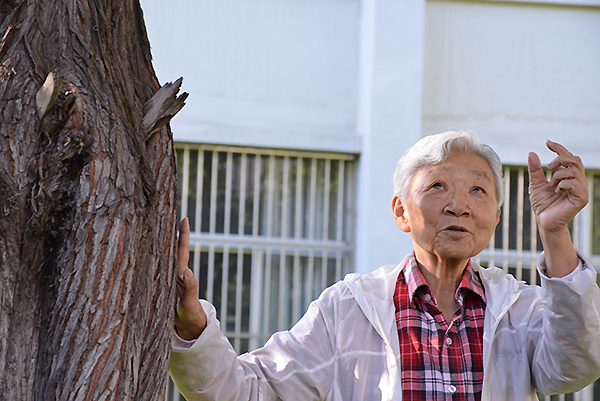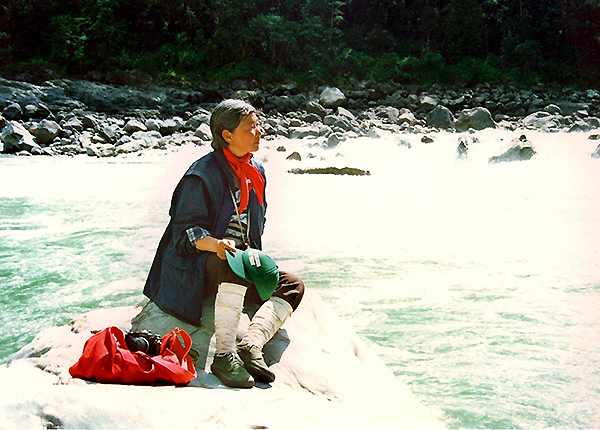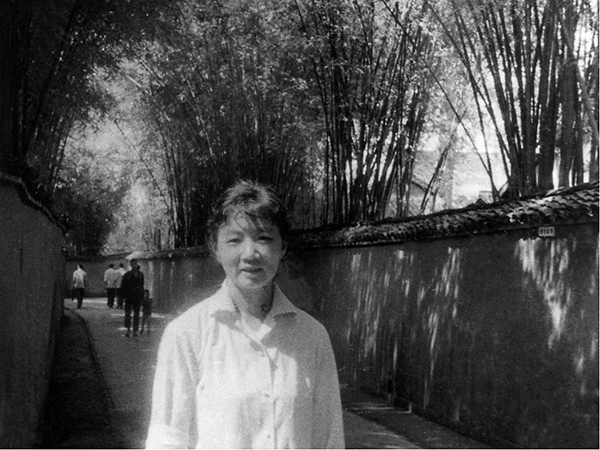The love affair with nature runs deep in Xu Fengxiang's veins, and it became an obsession when she began research in Tibet in 1978. The legendary ecologist finds it difficult to stop her career even though she is 84 year old, she tells China Daily's Chen Bei.
|
At nearly 5,000 meters above sea level, there ran two vehicles – an SUV and a truck – along the wildness of rolling alpine steppes studded with sand dunes, saline lakes and wetlands.
It was 1992. A seven-person ecology team spent more than one month driving some 14,000 km to do research in Chang Tang, a high altitude plateau in northern Tibet autonomous region. A year later and thanks to their efforts, the vast region was protected as a nature reserve with an area covering 247,000 sq km, the second largest of its kind in the world.
"As we drove into night one day, we saw flickering lights about hundreds of meters ahead and thought there would be inhabitants," recalled the team head Xu Fengxiang, 84, on a visit to eastern Tibet's Nyingchi city, where she founded China's first high-altitude ecology research institute 30 years ago.
The reddish-greenish flashes turned out to be the eyes of more than a dozen adult wolves. When the ecologists realized the danger, the howling pack had already surrounded them.
"The moment my driver rolled down the window and aimed a gun at the wolves, I stopped him," said Xu, the only woman of the research team. "I gave him three instructions – turn on both rear and head lights, blow the whistle and drive at a slower speed."
 |
|
Xu Fengxiang, 84, introduces to her students a type of spruce trees on a visit to Nyingchi city, where she founded China's first high-altitude ecology research institute 30 years ago, Aug 8, 2015. [Photo by Chen Bei/chinadaily.com.cn]
|
These instructions finally helped them break out of the siege of wolves.
Although it took place 23 years ago, the 84-year-old legend's memory of this thrilling adventure is still vivid. Age has not dulled her sharp mind or senses.
"This incident proved my point that there is active wildlife, including wolves, Tibetan gazelles, snow leopards and varieties of plants, in the so-called lifeless zone," said Xu, who proposed the region should be protected.
The ecologist had a maverick view of the relationship between man and nature. She insisted human beings have an equal status with other animal and plant species, which co-exist in the ecosystem.
"Man is nothing but one tiny biotic component in the entire ecosystem, and man should place himself at the mercy of nature rather than seek power over it at its source," she said.
Xu's love affair with nature has been running deep through her veins her whole life.
The love became an obsession in 1978, when the then 47-year-old university forestry ecology teacher bid farewell to her family in East China's Nanjing and began research on what she called five high-altitude ecosystems – glacier, water, grass, forest and fragile elements of coldness, aridness as well as desertification – on the Tibetan Plateau.
In the following 18 years until her retirement, Xu's footprints have covered 130,000 km and more than 20 virgin forests in Tibet for field research. She visited the base camp at Qomolangma, the world's highest mountain known in the West as Mount Everest, three times, respectively, aged 61, 70 and 78.
Located in Lynchi's Bome county, the Gangxiang Spruce Forest has an area of 46 sq km with more than 61 percent covered by spruce trees.
Without Xu's 7-year field survey in the 1980s, this forest would not have been measured and set as a nature reserve for protection. It was ranked by China National Geography Magazine as one of "Top 10 Most Beautiful Forests" in China in 2005.
"She is China's Jane Goodall," said Yang Ling, an environmentalist living in Beijing.
"Like Goodall who contributed her life to the study of wild chimpanzees and the environmental cause, Xu spent more than 60 years on the ecological study with the latter half of her career specializing in Tibetan ecology and helping establish a number of nature reserves."
In the past dozens of years, the ecologist has published eleven academic books introducing the distributions of wild flowers, mountains, valleys, rivers and forests in Tibet.
 |
|
Xu Fengxiang makes a field research on the Yarlung Zangbo River in the 1980s. [Photo provided to chinadaily.com.cn]
|
Sitting in a room at the ecology institute she founded, Xu said it would be her last visit to Tibet, where the lack of oxygen due to higher elevations may be harmful to her health as a senior.
"It is really too hard to say goodbye," said Xu, with tears welling up in her eyes.
"I bid farewell to the plateau many times since my retirement in 1995, but I flew back from Beijing again and again for the love of nature and this beautiful land in China."
Xu said she is currently working on publicizing ecological knowledge about Tibet and raising the awareness of protecting nature among the youth.
"I gave lectures to students about ten times a year and introduce them to the Tibetan plant species," she said.
"I'm glad to become a scientific preacher for Tibet till my death and a preacher encouraging man to protect our plateau species."
 |
|
Xu Fengxiang is pictured in this file photo when she was in her 20s in the Nanjing Forestry University, where she became a teacher after graduation.Photo provided to chinadaily.com.cn]
|